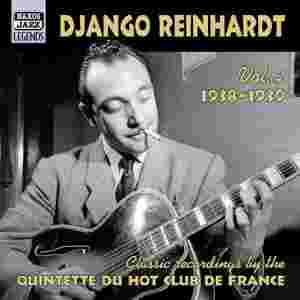|
>>> Większa okładka A <<<
>>> Większa okładka B <<<
Art Lange Pulse, November 2001 "The clean, crisp sound quality belies the age of the recordings, and Reinhardt shows why his playing influenced several generations of jazz and rock guitarists-with dazzling, ringing single note runs and slashing chords that energize ordinary tunes like "Them There Eyes" or "Sweet Georgia Brown." His spiky phrasing is a perfect contrast to the silky tone of Stephane Grappelli's violin, and the propulsive rhythm of the all-acoustic Quintet of the Hot Club of France just won't quit-even without drums. At this price, such great music is a steal." D. Oscar Groomes O’s Place Jazz Magazine, November 2001 "These eighteen songs come from five different sessions recorded between January 31, 1938 and March 21, 1939. The constant partner for Django (guitar) is Stephane Grappelli on fiddle. It is classic bluegrass." ----------------------------------------------------------------------- Volatile and unpredictable, Django Reinhardt was the first European musician to make a real impact on American jazz. A poet of the guitar, he was essentially a soloist and a star soloist at that but in the context of the Hot Club de France the wild extravagance of his personality and gypsy exuberance of his playing were complemented and controlled by the overall refinement of Grappelli: the group’s polished yet buoyant, uniquely infectious rhythm earned them a special place in the Pantheon of jazz history. Django was born Jean-Baptiste Reinhardt at Liberchies, near Charleroi, in Belgium on January 23, 1910. The son of an itinerant violinist-entertainer father and a gypsy dancer mother who were both active members of a Romany travelling troupe, his childhood was essentially an unstable and nomadic existence spent in caravans. Musically speaking, as in other ways, Django was left largely to his own devices. A self-taught, prodigious talent who by his teens was already a fully-fledged multi-instrumentalist (violin, banjo and guitar), he quickly absorbed all the latest trends. Popular in Parisian cafés and cabarets, his style of playing became renowned for its synthesising of imported American jazz with traditional gypsy rhythms. Following a period of convalescence from a caravan fire in 1928 (owing to an injury sustained to his left hand he had to develop a special technique to make up for the paralysis of two fingers), he worked for several years as an accompanist to various prominent Parisian cabaret singers, most notably Jean Sablon. During 1933, he first gigged with Grappelli in André Ekyan’s band at the avant garde Croix du Sud and the following year the two were the founding star-turns of the group which became known as the Quintette du Hot Club de France. Stephane Grappelli was born in Paris on January 26, 1908. The son of an immigrant Italian dancer and would-be business entrepreneur, his artistic aspirations inclined first towards dancing (he trained as a child at the school of Isadora Duncan) but, stirred by classical music, he took a serious interest in the violin from the age of twelve. He underwent formal training at the Paris Conservatoire but by the late 1920s, like his future colleague Django, had fallen under the spell of such American jazz giants as Armstrong and Beiderbecke, and was particularly influenced by the violinist Venuti. By the mid-1920s he was already playing both piano and violin in silent cinemas, by 1927 was jazzing at Parisian society functions and in 1928, while still a pianist with Grégor et ses Grégoriens, first made the switch to jazz violin. Following various tours of southern France and South America, by 1931 Stephane was regularly heard at the Croix du Sud. In October 1932, he rejoined Grégor at the Olympia and went with this ensemble on tour to Zurich, Lugano, Milan, Rome and St. Jean-du-Luz prior to the group’s final disbanding, in 1933. The following year, with Django, Django’s brother Joseph and Roger Chaput on guitars and Louis Vola on string bass, he formed the original Quintette du Hot Club de France which made its first recordings in December 1934 and swiftly won renown throughout Europe and the United States. Based in Paris the group, which underwent occasional changes in personnel, recorded a varied repertoire, comprising such Grappelli-Reinhardt compositions as Appel indirect, Billets doux and Swing 39, plus a melange of arrangements reviving popular American song-hits of earlier vintage (Japanese Sandman, by Richard A. Whiting, dates from 1920; I Wonder Where My Baby Is Tonight, by Walter Donaldson, from 1925; and Them There Eyes by Maceo Pinkard and Three Little Words by Harry Ruby, from 1930). During 1938 and 1939 – prior to Grappelli’s residency in London following the outbreak of World War 2 and the start of his solo career with George Shearing and others – the Quintette made various guest appearances in the British capital. There, in between concert appearances, the ensemble assigned to shellac a similar cross-section including (among the Grappelli-Reinhardt numbers) Stompin’ At Decca, Souvenirs, Nocturne and Black And White, plus such by now more familiar eclectic repertoire as Sweet Georgia Brown (Maceo Pinkard, 1925), Honeysuckle Rose (Fats Waller and Andy Razaf, 1929) and Cole Porter’s Night And Day (1932) and Why Shouldn’t I? (1935). Grappelli may also be savoured in duet with Django in his dual capacity as keyboard in It Had To Be You (Isham Jones, 1924), If I Had You (Ted Shapiro, Jimmy Campbell and Reg Connelly, 1928) and the then brand new J’attendrai (a Dino Olivieri cabaret theme which enjoyed several revivals in 1945). Peter Dempsey, 2001
|

